
The American robin is a migratory bird of the true thrush genus and Turdidae, the wider thrush family. It is named after the European robin because of its reddish-orange breast, though the two species are not closely related, with the European robin belonging to the Old World flycatcher family. The American robin is widely distributed throughout North America, wintering from southern Canada to central Mexico and along the Pacific coast.

The common blackbird is a species of true thrush. It is also called the Eurasian blackbird, or simply the blackbird where this does not lead to confusion with a similar-looking local species. It breeds in Europe, western Asia, and North Africa, and has been introduced to Australia and New Zealand. It has a number of subspecies across its large range; a few former Asian subspecies are now widely treated as separate species. Depending on latitude, the common blackbird may be resident, partially migratory, or fully migratory.

The song thrush is a thrush that breeds across the West Palearctic. It has brown upper-parts and black-spotted cream or buff underparts and has three recognised subspecies. Its distinctive song, which has repeated musical phrases, has frequently been referred to in poetry.

The ring ouzel is a mainly European member of the thrush family Turdidae. It is a medium-sized thrush, 23–24 centimetres (9.1–9.4 in) in length and weighing 90–138 grams (3.2–4.9 oz). The male is predominantly black with a conspicuous white crescent across its breast. Females are browner and duller than males, and young birds may lack the pale chest markings altogether. In all but the northernmost part of its range, this is a high-altitude species, with three races breeding in mountains from Ireland east to Iran. It breeds in open mountain areas with some trees or shrubs, the latter often including heather, conifers, beech, hairy alpenrose or juniper. It is a migratory bird, leaving the breeding areas to winter in southern Europe, North Africa and Turkey, typically in mountains with juniper bushes. The typical clutch is 3–6 brown-flecked pale blue or greenish-blue eggs. They are incubated almost entirely by the female, with hatching normally occurring after 13 days. The altricial, downy chicks fledge in another 14 days and are dependent on their parents for about 12 days after fledging.

The mistle thrush, also spelled missel thrush, is a bird common to much of Europe, temperate Asia and North Africa. It is a year-round resident in a large part of its range, but northern and eastern populations migrate south for the winter, often in small flocks. It is a large thrush with pale grey-brown upper parts, a greyish-white chin and throat, and black spots on its pale yellow and off-white under parts. The sexes are similar in plumage, and its three subspecies show only minimal differences. The male has a loud, far-carrying song which is delivered even in wet and windy weather, earning the bird the old name of stormcock.

The African thrush or West African thrush is a passerine bird in the thrush family Turdidae. It is common in well-wooded areas over much of the western part of sub-Saharan Africa, it was once considered to be conspecific with the olive thrush but that species has now been split further. Populations are resident (non-migratory).
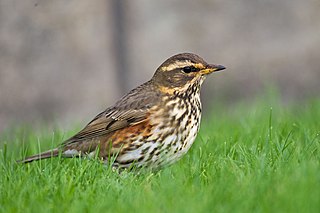
The redwing is a bird in the thrush family, Turdidae, native to Europe and the Palearctic, slightly smaller than the related song thrush.

The eyebrowed thrush is a member of the thrush family Turdidae. It breeds in dense coniferous forest and taiga eastwards from Siberia and Mongolia to Japan. It is strongly migratory, wintering south to China and Southeast Asia. It is a rare vagrant to western Europe.

The dusky thrush is a member of the thrush family which breeds eastwards from central Siberia to Kamchatka wintering to Japan, South China and Myanmar. It is closely related to the more southerly breeding Naumann's thrush T. naumanni; the two have often been regarded as conspecific. The scientific name comes from Latin Turdus, "thrush" and Ancient Greek eunomos, "orderly".

The cocoa thrush is a resident breeding thrush in South America, from eastern Colombia south and east to central and eastern Brazil, as well as on the Caribbean island of Trinidad and some of the Lesser Antilles.

The white-necked thrush is a songbird found in forest and woodland in South America. The taxonomy is potentially confusing, and it sometimes includes the members of the T. assimilis group as subspecies, in which case the "combined species" is referred to as the white-throated thrush. On the contrary, it may be split into two species, the rufous-flanked thrush and the grey-flanked thrush.

The yellow-legged thrush is a songbird of northern and eastern South America and the Caribbean.
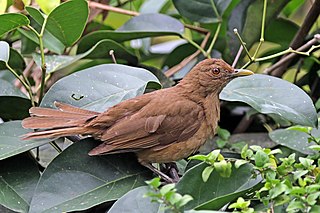
The clay-colored thrush is a common Middle American bird of the thrush family (Turdidae). It is the national bird of Costa Rica, where it is well known as the yigüirro. Other common names include clay-colored robin.

Platycichla is a small disputed genus of tropical South American thrushes. It contains just two species:
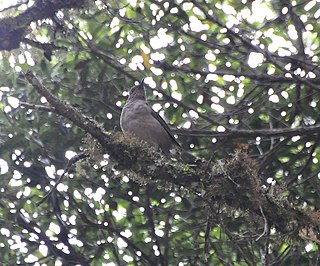
The mountain thrush is a large thrush which is found in Central America. It was formerly known as the mountain robin. Some authorities refer to it as the American mountain thrush to differentiate it from the Abyssinian thrush, known in their taxonomy as the African mountain thrush.

The groundscraper thrush is a passerine bird of southern and eastern Africa belonging to the thrush family, Turdidae. It was previously considered the only member of the genus Psophocichla, but phylogenetic analysis supports it belonging in the genus Turdus, of which it is the most basal species.
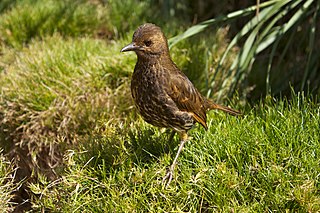
The Tristan thrush, also known as the starchy, is a species of bird in the thrush family that is endemic to the British overseas territories of the isolated Tristan da Cunha archipelago in the South Atlantic Ocean.

The pale-eyed thrush is a species of bird in the family Turdidae.

The white-throated thrush is a species of bird in the family Turdidae. It is found in Mexico and Central America, ranging south to central Panama. This species has been referred to in some literature as "white-throated robin." However, that name is now more usually applied to the Old World species Irania gutturalis.
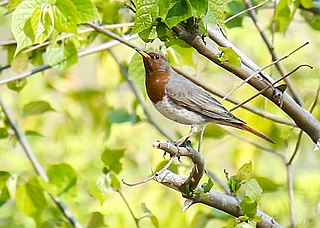
The red-throated thrush is a passerine bird in the thrush family. It is sometimes regarded as one subspecies of a polytypic species, "dark-throated thrush", black-throated thrush then being the other subspecies. More recent treatments regard the two as separate species. The scientific name comes from Latin. Turdus is "thrush" and the specific ruficollis is derived from rufus', "red", and collum, "neck".






















